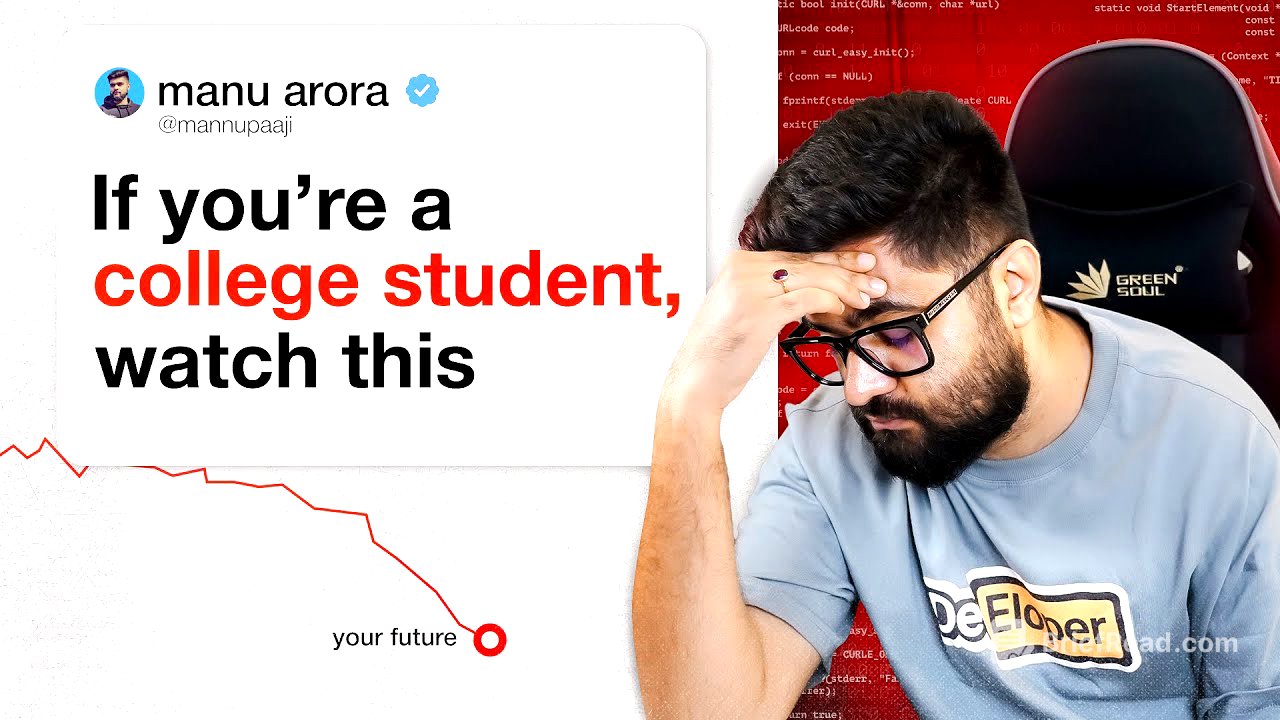TLDR;
This video provides actionable steps for college students, particularly those in their third or fourth year, who feel they haven't accomplished enough and are concerned about placements. It emphasizes that everyone's journey is different and focuses on practical advice to optimize the remaining time in college. The key points include:
- Start building projects to gain practical skills and showcase abilities.
- Find a mentor for code reviews and guidance.
- Surround yourself with a supportive and motivated environment.
- Share your work and adopt a problem-solving mindset.
- Participate in hackathons to gain experience and a reality check.
Introduction [0:00]
The video addresses students in their third or second year who feel they haven't achieved much compared to their peers. It aims to provide actionable steps to make the most of their remaining time in college. The speaker emphasizes that everyone's journey is unique, and the environment plays a crucial role. He acknowledges the confusion and feelings of inadequacy many students face as placements approach, and he intends to offer solutions to help them reach a competitive level.
Start Building Projects [2:00]
The first step is to start building projects. Coding is about solving problems, and projects are the best way to learn. Start with web development because the entry barrier is lower, focusing on HTML, CSS, and JavaScript. Learning the basics of C programming is recommended to understand the fundamentals of programming. Use tutorials, but avoid "tutorial hell" by recreating what you learn in new files to identify and fill gaps in your understanding.
Long-Term Thinking and Niching Down [5:26]
Adopt long-term thinking by understanding the basics of each project. If you're building a CRUD API, understand why it's structured that way. After building basic projects, niche down to solve specific problems. For example, instead of a general Netflix clone, create a website for underrated movies. This helps develop a problem-solving mindset and requires implementing things beyond the tutorial, using your own brain to write code.
Get a Mentor [9:10]
A mentor is someone who can review your code and guide you. This could be a friend, a professor, or someone from a coding community. Mentors can provide valuable advice and save you time by pointing out mistakes and suggesting better approaches. Platforms like Real Dev Squad offer communities where you can find mentors and learn about code ownership and product shipping.
Environment Matters [12:56]
Your environment significantly impacts your progress. Surround yourself with motivated peers who are building things and discussing ideas. The environment in top-tier colleges like IITs fosters innovation and collaboration. Find a peer group that is motivated and wants to achieve something in their lives. Peer review and discussing ideas can help you learn and grow.
Share Your Work and Problem-Solving Mindset [17:11]
Share your work on platforms like Twitter and Pairlist to get feedback and connect with like-minded people. Adopt a problem-solving mindset by immediately addressing bugs and finding ways to improve your projects. If your code isn't working, use available resources to solve the problem. AI tools can also help. Focus on solving problems and finding new problems to solve.
Join Clubs and Participate in Hackathons [19:59]
Participate in hackathons for the experience and environment they provide, not necessarily to win. The pressure and collaboration during hackathons can teach you a lot about coding and problem-solving. Completing a hackathon project will give you a reality check and show you how far you've come. Hackathons demonstrate that tasks can be completed in the time you allocate.
Conclusion [22:24]
The video concludes by reiterating that it's never too late to start. Even if you haven't done much in your first few years of college, you can still catch up by following the steps outlined. Focus on coding, building projects, and surrounding yourself with a supportive environment. The speaker encourages viewers to reach out with specific questions on Twitter.









